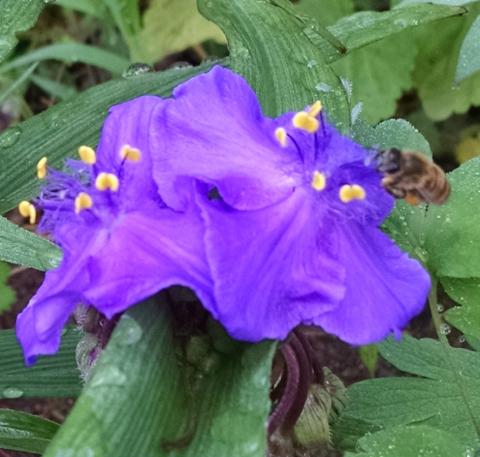
Happy National Pollinator Week! WAIT - don’t go anywhere. I promise this has some relevance for folks who are 1) not obsessed with gardening, and/or 2) not obsessed with bees. Hear me out.
Pollinators like bees and butterflies have a HUGE and essential role to play in our food system. In short: if you like food, you like pollinators. We need pollinators to grow beans, beets, broccoli, carrots, peaches, strawberries, parsley, sesame, peanuts, clover, cotton… the list goes on. Seriously - it’s really long. Check it out here.
Some facts:
- 90% of plant species rely on pollinators. And 75% of crops we rely on for food, medicines, etc. rely on pollinators. Source: USDA.
- And here’s a fun fact for the kids (and insect-lovers): there are about 200,000 animal species that pollinate plants. About 1000 are vertebrates and the rest (do the math) are invertebrates like butterflies and bees. (I’m sensing a rekindled interest in bug-hunting in my house once I share this one!) Source: USDA.
Ok so pollinators = good for our food. We get it. But let’s not stop with a simple shout-out. There’s a lot we can do to support pollinators in our ecosystem.
You’ve probably heard of Colony Collapse Disorder, which has killed tens of thousands of bee colonies over the last decade, resulting in a shortage of bees to help pollinate our food supply. We’re still not totally sure why the bees are dying, but many folks think pesticides are playing a strong role, in particular neonicotinoid insecticides which, according to a study from Newcastle University, give bees an addictive buzz, much like nicotine. A second study from Sweden’s Lund University shows that “a preference for neonics can have particularly nasty side effects: As the bees consume more of the insecticides, they’ll get sicker, losing motor function and foraging abilities…” (Read about both studies here.) Addictive, harmful substances overriding our physical controls with devastating effects on our health? Uh, sounds familiar, and terribly scary, right?
On top of all of that, we are drastically transforming much of our native habitat - which is full of places, foods and animals that support pollinators - into suburbia and farmland. According to Dr. Douglas Tallamy “We have turned 54% of the lower 48 states into cities and suburbs, and 41% more into various forms of agriculture. That’s right: we humans have taken 95% of nature and made it unnatural…Our fellow creatures need food and shelter to survive and reproduce and in too many places we have eliminated both.”
Stay with me - all is not lost! We can protect our biodiversity and support pollinators through simple acts that make a big difference.
1. Know your pesticides. Read the label before you spray, and know whether a product can harm pollinators. Way too many of us use pesticides and insecticides as a default solution to anything that buzzes. Always pause and explore other approaches for treating pests, including IPM (Integrated Pest Management), which encourages the use of prevention (for example cleaning your counter or fixing cracks in screens), exclusion and non chemical approaches to pests before you spray. Check out some tips on pesticide use and IPM.
2. Encourage your pollinators! Throw a long-term pollinator party by planting native plant species. Did you know, for example, that Goldenrod supports 115 butterfly/moth species in Pennsylvania? Asters support 112, and sunflowers 73. Let me break that down: that’s A LOT. (For the record: Ragweed causes hay fever, not Goldenrod.) These and other native varieties are easy to plant, beautiful in the yard or garden, and attract all sorts of cool caterpillars and butterflies to your space. That’s a win-win on all levels. Just search “native plants for pollinators in [your state]” and you’ll find lots of ideas. Here’s a great resource to get you started.
Indeed, there's lots going on in the world that needs our attention. Pausing for a moment to think about how to support some of the smallest, fuzziest and most important players in the food system is time well spent. And as a mom-of-a-five-year-old, I'll say it's pretty fun, too.
Please share what you're doing for National Pollinator Week in the comments, below!



The views and opinions expressed in this post are those of the author(s) and do not necessarily reflect those of MomsRising.org.
MomsRising.org strongly encourages our readers to post comments in response to blog posts. We value diversity of opinions and perspectives. Our goals for this space are to be educational, thought-provoking, and respectful. So we actively moderate comments and we reserve the right to edit or remove comments that undermine these goals. Thanks!